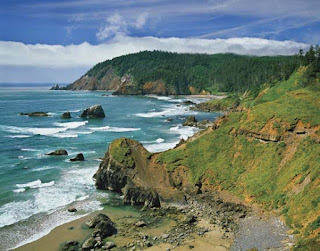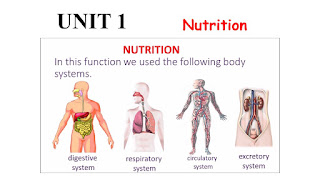Oceanic climate
Also called coastal or maritime.
Temperature: mild winters and summers. Winters are cool but not very cold. Not big changes in temperature.
Precipitation: constant throughout the year, although there is less summer. There’s no dry season. Lots of clouds.
Where? West of Europe. In Spain in the Cantabrian Watershed.
 |
Oceanic Climate
|
Vegetation: deciduous trees, like oak, beech, eucalyptus. On the coast there are flat areas of wild plants, shrubs, grass and bushes.
Landscape: humid regions with a great deal of vegetation due to abundant rainfalls and rich soil. Extensive forests of deciduous trees such as oaks and beeches with bushes and grassy meadows for livestock.
Mediterranean climate
Temperature: Mild. Few extreme temperatures. The average is around 15°C. But normally the temperature is over 22°C.
Only two seasons: summer and winter. Summers are longer than winter and the winter is very mild. Eastern and southern Spain as well as the Balearic Islands.
Vegetation: Dehesa forests of evergreen species such as holm oaks, cork oaks, and pines, with two kinds of bushes:
- Maquis Shrubland: very dense and compact with tall bushes such as the strawberry tree, heather and the rockrose.
- Thickets: low bushes found in drier areas such as rosemary, thyme and lavender.
 |
Mediterranean Climate
|
Mountain Climate
Where? Peaks higher than 2.000 meters more or less. Examples: Navacerrada, Potes, Sistema Central, Sistemas Béticos, Pyrenees. Sierra de Guadarrama. Sierra de Gredos.
Extensive forests of evergreen trees such as pine woods or deciduous trees such as beech woods. In the summits, if it’s very high, there are no trees.
Low temperatures. Snow in winter. High range of changes. Weather conditions can change very quickly with strong winds, storms, rainfalls, snow, hail or fog.
Always take precautions if you go out hiking.
Parts of a mountain: foot, slope, peak and summit.
 |
| Mountain Climate |
Continental climate
Continental climate happens in places away from the coast. In the interior of a continent. Example: the european plain. Meseta Central. Madrid has Continental climate.
Temperature: hot summers and cold winters. Important annual variation in temperature.
Temperatures are not moderated by bodies of water such as oceans or seas. Large range of temperatures.
Precipitation: tends to be moderate in amount, concentrated mostly in the warmer months. Small annual precipitations. Low relative humidities.
 |
Continental Climate (Meseta Central)
|
Tropical climate
High temperatures. The average is around 20°C or higher. Very humid. Stationary rains in January, September and October.
Where? Canary Islands.
The Canary Islands (Lanzarote, Fuerteventura, Gran Canaria, Tenerife, El Hierro, La Palma y La Gomera). The Canary Islands are a volcanic mountainous area with many indigenous species such as the Canary Pine, the Giant Cactus, the Drago tree and the Tabaiba. On the southern slopes, plants are adapted to drought conditions and the more humid northern vegetation is more abundant.
 |
| La Palma (Tropical Climate) |
Here is another beautiful photo of the Canary Islands! Have you ever been there?
I hope you enjoy this topic! Do you want to know more about climate? Then...
check this web!



















